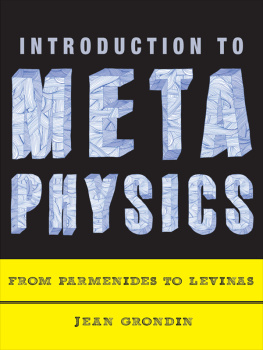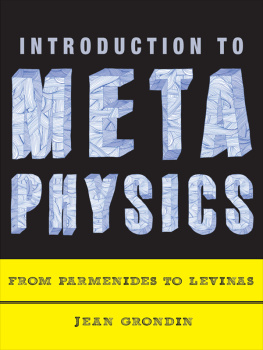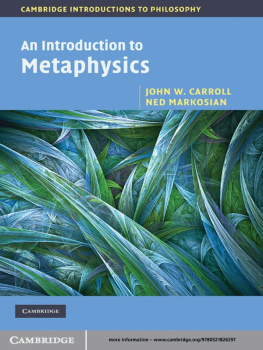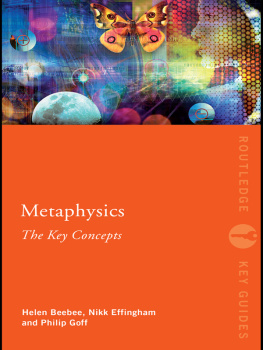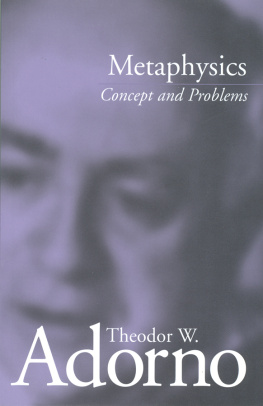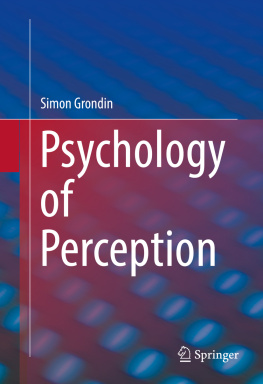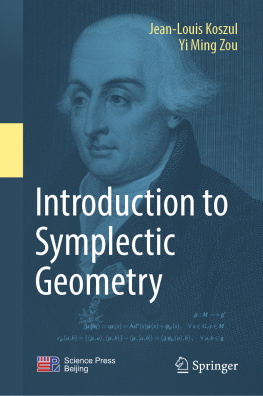Jean Grondin - Introduction to Metaphysics
Here you can read online Jean Grondin - Introduction to Metaphysics full text of the book (entire story) in english for free. Download pdf and epub, get meaning, cover and reviews about this ebook. City: New York, year: 2012, publisher: Columbia University Press, genre: Science. Description of the work, (preface) as well as reviews are available. Best literature library LitArk.com created for fans of good reading and offers a wide selection of genres:
Romance novel
Science fiction
Adventure
Detective
Science
History
Home and family
Prose
Art
Politics
Computer
Non-fiction
Religion
Business
Children
Humor
Choose a favorite category and find really read worthwhile books. Enjoy immersion in the world of imagination, feel the emotions of the characters or learn something new for yourself, make an fascinating discovery.
- Book:Introduction to Metaphysics
- Author:
- Publisher:Columbia University Press
- Genre:
- Year:2012
- City:New York
- Rating:5 / 5
- Favourites:Add to favourites
- Your mark:
- 100
- 1
- 2
- 3
- 4
- 5
Introduction to Metaphysics: summary, description and annotation
We offer to read an annotation, description, summary or preface (depends on what the author of the book "Introduction to Metaphysics" wrote himself). If you haven't found the necessary information about the book — write in the comments, we will try to find it.
Introduction to Metaphysics — read online for free the complete book (whole text) full work
Below is the text of the book, divided by pages. System saving the place of the last page read, allows you to conveniently read the book "Introduction to Metaphysics" online for free, without having to search again every time where you left off. Put a bookmark, and you can go to the page where you finished reading at any time.
Font size:
Interval:
Bookmark:
INTRODUCTION TO METAPHYSICS

JEAN GRONDIN
TRANSLATED BY LUKAS SODERSTROM
INTRODUCTION TO METAPHYSICS

From Parmenides to Levinas
COLUMBIA UNIVERSITY PRESS NEW YORK

COLUMBIA UNIVERSITY PRESS
Publishers Since 1893
NEW YORK CHICHESTER, WEST SUSSEX
cup.columbia.edu
Introduction la mtaphysique 2004 by Les Presses de lUniversit de Montral
Published under arrangement with Les Presses de lUniversit de Montral, Qubec, Canada
English translation 2012 Columbia University Press
All rights reserved
E-ISBN 978-0-231-52723-1
Library of Congress Cataloging-in-Publication Data
Grondin, Jean.
[Introduction la mtaphysique. English]
Introduction to metaphysics : from Parmenides to Levinas / Jean Grondin ; translated by Lukas Soderstrom.
p. cm.
Includes bibliographical references (p.).
ISBN 978-0-231-14845-0 (cloth : alk. paper)ISBN 978-0-231-14844-3 (pbk. : alk. paper) ISBN 978-0-231-52723-1 (ebook)
1. MetaphysicsHistory. I. Title.
BD112.G7613 2012
110dc22
2011012094
A Columbia University Press E-book.
CUP would be pleased to hear about your reading experience with this e-book at cup-ebook@columbia.edu.
References to Internet Web sites (URLs) were accurate at the time of writing. Neither the author nor Columbia University Press is responsible for URLs that may have expired or changed since the manuscript was prepared.
To all my students
There is a science which investigates Being as Being.
ARISTOTLE, METAPHYSICS, IV, 1
Thus, all philosophy is like a tree, of which Metaphysics is the root, Physics the trunk, and all the other sciences the branches that grow out of this trunk, which are reduced to three principal, namely, Medicine, Mechanics, and Ethics.
REN DESCARTES, PREFACE TO THE PRINCIPLES OF PHILOSOPHY
Metaphysics is without a doubt the most difficult of all things into which man has insight.
But so far no metaphysics has ever been written.
IMMANUEL KANT, INQUIRY CONCERNING THE DISTINCTNESS OF THE PRINCIPLES OF NATURAL THEOLOGY AND MORALITY
A people without any metaphysics is like a temple without a Holy of Holies.
G. W. F. HEGEL, PREFACE TO THE FIRST EDITION OF THE SCIENCE OF LOGIC
Metaphysics belongs to human nature. It is neither a division of academic philosophy nor a field of arbitrary notions. Metaphysics is the fundamental event of our existence. It is our existence itself.
MARTIN HEIDEGGER, WHAT IS METAPHYSICS?
CONTENTS


This book hopes to introduce the reader to the intellectual discipline called metaphysics. If quotation marks are called for, it is because metaphysics is not a science that is taught today in any significant way. Even though some once considered it to be the queen of the sciences, there are no faculties of metaphysics like there are, say, departments of physics, mathematics, or theology. In fact, there never were any such faculties or departments. Nowadays, and for quite some time now, metaphysics is more often than not used as a foil for so-called postmetaphysical thought as though being nonmetaphysical were some kind of philosophical virtue. Indeed, most major trends in contemporary philosophyphenomenology, analytic philosophy, and deconstructiongenerally agree on the urgency of overcoming metaphysics. But what is thereby overcome? Is it always known? And, are these new postmetaphysical trends even thinkable without the insights of their metaphysical forbearers?
The author of this book belongs to a generation that was not schooled in metaphysics and was taught instead that it represented an illusory, inherently repressive, and even tyrannical form of thought from which one had to be freed. This was proclaimed, and quite autocratically at that, in the name of the philosophies of Heidegger and Kant. But as any impartial reader will not fail to notice, both Kant and Heideggers philosophical projects were not only profoundly influenced by metaphysics, they were metaphysical to the core. To be sure, Kant faulted traditional metaphysics for laying claim to a form of knowledge that would go beyond experience, but he himself laid the groundwork of a metaphysics of nature and a metaphysics of morals, which culminated in a proof of the existence of God and of the immortality of the soul. Quite a feat for a gravedigger of metaphysics. As for Heidegger, he stigmatized metaphysics because it aimed at a rational, theological and totalizing account of Being. But he was himself seeking a new understanding of Being (for which he unearthed indicative names, like Ereignis or Seyn), obviously set forth reasons and arguments for doing so, and did so in the hope of preparing a new experience of the divine in a modern world which has been abandoned by the gods. As with Kant, all his basic terms (Being, essence, truth, existence, ground, foundation, identity) were borrowed from the metaphysical tradition, to which his major interlocutors (Parmenides, Heraclitus, Plato, Aristotle, Augustine, Descartes, Leibniz, Kant, Hegel, Schelling, and Nietzsche) belonged. Indeed, one does not need an advanced degree to know that Kants ultimate goal was to make metaphysics possible and Heideggers was to reawaken the question of Being, which is undoubtedly one the most important themes of all metaphysics. Why was this overlooked in the rush to overcome metaphysics?
Moreover, when did metaphysics ever exert its purported hegemony? Certainly not during Antiquity. Since the term metaphysics was not coined until the twelfth century, the Ancients can hardly be called metaphysicians. Hellenistic schools (Stoicism, Epicureanism, Skepticism) nor the Romans really prolonged its first halting steps in any meaningful fashion (at least until Neo-Platonism).
What about the Middle Ages? The image of a Middle Ages completely beholden to metaphysics is an unfortunate myth. Since the medieval world encountered metaphysical thought rather belatedly and, since it strongly relied on a revelation which came from another source than feeble human reason, metaphysics was never dominant or uncontested. In fact, the average reader will be hard-pressed to name even a single medieval author who presented his own thought as metaphysics.
As for modernity, it has, since Descartes, sought to oppose and overcome metaphysics in the name of another first philosophy, but it has only done so on the basis of a more rigorous conception of reality and a better account of Being, its principles, and reasons. But this new attempt to better explain the Being of things, and thus to go beyond the inherited and erroneous discourses, reiterated the fundamental hope of metaphysical thoughtthat is, that of an accurate account of Being and its reasons. It is indeed very difficult to overcome metaphysics without presupposing it or putting it into practice.
Thus this book wishes to recall, against all odds, that metaphysics is the insurmountable presupposition of all thought insofar as it carried and supported the project of a universal understanding of the world that inquires into the Being and reason for things.
Next pageFont size:
Interval:
Bookmark:
Similar books «Introduction to Metaphysics»
Look at similar books to Introduction to Metaphysics. We have selected literature similar in name and meaning in the hope of providing readers with more options to find new, interesting, not yet read works.
Discussion, reviews of the book Introduction to Metaphysics and just readers' own opinions. Leave your comments, write what you think about the work, its meaning or the main characters. Specify what exactly you liked and what you didn't like, and why you think so.

